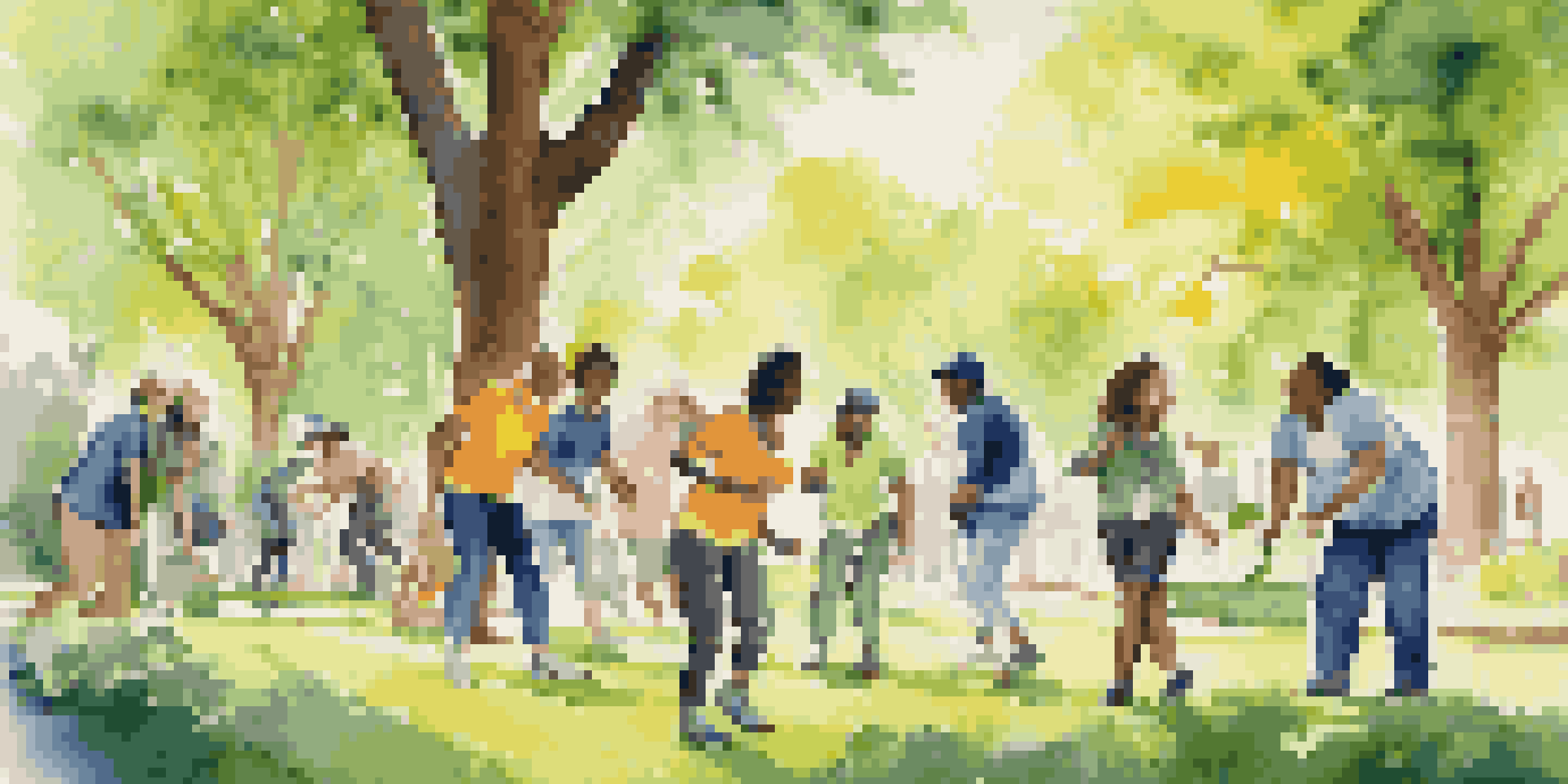Team-Building Activities that Promote Effective Collaboration

Icebreaker Games to Build Trust Among Team Members
Icebreaker games are a fantastic way to kick off team-building activities, especially for new teams. They create a relaxed environment where team members can get to know each other on a personal level. For example, a simple game like 'Two Truths and a Lie' encourages individuals to share fun facts about themselves, fostering connections and trust.
Coming together is a beginning; keeping together is progress; working together is success.
These games can also break down barriers and help team members feel more comfortable expressing their thoughts and ideas. Trust is the foundation of effective collaboration, and icebreakers set the tone for open communication. By starting with light-hearted activities, teams can transition into more serious collaborative tasks with greater ease.
Ultimately, icebreaker games not only serve as an introduction but also create a sense of belonging. When team members feel that they know and trust each other, they are more likely to collaborate effectively, leading to better outcomes in their projects.
Problem-Solving Workshops for Creative Thinking
Organizing problem-solving workshops can significantly boost a team's collaborative spirit. These workshops encourage team members to tackle challenges together, enhancing their critical thinking and creativity. For instance, using case studies relevant to your industry can spark innovative ideas as everyone brings their unique perspective to the table.

During these sessions, individuals learn to listen actively and respect differing viewpoints, which are essential skills for effective collaboration. Working through problems collectively not only strengthens relationships but also fosters a culture of teamwork and shared responsibility. This collaborative environment can lead to groundbreaking solutions and improved project outcomes.
Icebreakers Foster Team Trust
Icebreaker games create a relaxed environment that encourages team members to connect, building trust and enhancing communication.
Additionally, problem-solving workshops provide a space for constructive feedback and brainstorming. By creating a safe atmosphere for sharing ideas, teams can explore various possibilities and, ultimately, enhance their collaborative efforts in real-world scenarios.
Outdoor Team Challenges to Boost Team Spirit
Outdoor team challenges are a fun way to encourage collaboration while stepping outside the usual office environment. Activities like obstacle courses or scavenger hunts not only get team members moving but also require them to strategize and work together. For instance, a scavenger hunt can promote communication and planning as teams navigate to find clues and complete tasks.
The strength of the team is each individual member. The strength of each member is the team.
These physical activities foster a sense of camaraderie and build a strong team spirit. As team members face challenges together, they learn to rely on each other’s strengths and support one another. The shared experience of overcoming obstacles can deepen relationships and enhance trust within the group.
Ultimately, outdoor challenges can lead to improved morale and increased motivation back at work. When team members have fun together outside the office, they often return with a refreshed outlook and a stronger commitment to collaborating effectively.
Collaborative Projects to Enhance Team Dynamics
Engaging in collaborative projects is one of the most effective ways to promote teamwork. By working together on a common goal, team members can learn to appreciate each other’s skills and contributions. For example, a group project that requires input from various departments can highlight the importance of diverse perspectives in achieving success.
These projects encourage communication and foster a sense of accountability among team members. When individuals see how their efforts directly impact the outcome, they become more invested in the process. This shared sense of purpose can strengthen the team’s dynamic and enhance overall collaboration.
Collaboration Boosts Team Dynamics
Engaging in collaborative projects allows team members to appreciate diverse skills and perspectives, strengthening overall teamwork.
Moreover, collaborative projects allow for real-time feedback and learning opportunities. As team members navigate challenges together, they develop problem-solving skills and a deeper understanding of each other’s working styles, which can lead to more effective collaboration in future tasks.
Team Retreats for Deepening Relationships
Team retreats provide an excellent opportunity for employees to bond outside of the regular work routine. By spending quality time together in a different environment, team members can develop deeper relationships that foster better collaboration. Whether it’s a weekend getaway or a day-long workshop, the informal setting encourages open dialogue and connection.
During retreats, teams can engage in various activities that promote teamwork, from brainstorming sessions to recreational challenges. These experiences allow individuals to interact in a relaxed manner, breaking down formal barriers and enhancing their communication skills. As they share meals or engage in team-building exercises, trust and rapport grow stronger.
Ultimately, the benefits of team retreats extend far beyond the time spent away from the office. When team members return, they often bring a renewed sense of commitment and enthusiasm for collaboration, positively impacting the workplace culture.
Feedback Sessions for Continuous Improvement
Regular feedback sessions are essential for fostering a culture of collaboration. These sessions provide an opportunity for team members to share their thoughts on what’s working well and what could be improved. By creating a safe space for open dialogue, teams can address challenges and celebrate successes together.
During these sessions, it’s crucial to encourage constructive criticism and positive reinforcement. When team members feel heard and valued, they are more likely to engage in collaborative efforts moving forward. This ongoing feedback loop nurtures trust and encourages individuals to contribute more actively to team discussions.
Fun Competitions Spark Team Spirit
Incorporating friendly competitions promotes motivation and camaraderie, helping teams bond and work more effectively together.
Moreover, feedback sessions allow teams to identify areas for growth and development. By reflecting on past projects, teams can strategize on how to enhance their collaboration skills and improve their overall performance in future endeavors.
Fun Competitions to Encourage Healthy Rivalry
Incorporating friendly competitions into team-building activities can spark motivation and enthusiasm among team members. Whether it's a trivia contest or a sports day, these competitions encourage collaboration while adding an element of fun. For example, forming teams to compete in a cooking challenge can foster creativity and teamwork as members strategize together.
Healthy rivalry can also lead to improved performance as individuals push each other to excel. When team members work together in a competitive setting, they learn to communicate effectively and support one another to achieve common goals. This shared experience can solidify bonds and enhance collaboration in the workplace.

Ultimately, fun competitions create lasting memories that contribute to a positive team culture. When employees enjoy their time together, they are more likely to collaborate efficiently and foster a sense of unity that can drive the team’s success.